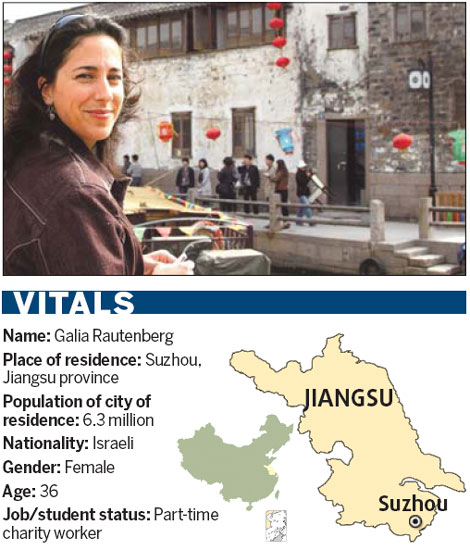Life and Leisure
Settling in 'clean, green and peaceful' Suzhou
By Mu Qian (China Daily)
Updated: 2010-08-10 13:59
 |
Large Medium Small |

EDITOR's Note: "Home & Away" is a section about the life experiences of expats living outside of the major metropolises like Beijing and Shanghai. If you are such an expat and have an interesting story to share, please send an e-mail to expat@chinadaily.com.cn.
When Galia Rautenberg first arrived in China ten years ago to study Chinese, she found it difficult to adjust to the new environment.
As the only student from Israel at Nanjing University, she felt so lonely she ended up calling her family, cried and said she wanted to return home.
A decade later she is still in China. After studying for a year in Nanjing and working for eight years in Beijing she now lives in Suzhou, with her German husband, whom she met in China.
Rautenberg moved to Suzhou principally because of her husband's work commitments, but she believes she has had a strong connection to the city since she first visited nine years ago.
She describes it as "clean, green and peaceful" and enjoys the slower pace of life, its elegance and waterways. She loves its people though she complains sometimes about the shortage of taxis and humid summers.
"Chinese friends told me that Suzhou is the right place to retire, so that's what I did, early retirement following my heart doing things that make me happy," she says.
Rautenberg does volunteer work twice a week at a welfare shelter for abandoned children, where she helps care for the children and helps out with translation and liaison work.
She also started a project to help patients at a nearby psychiatric institute by selling their hand-made crafts, the proceeds of which are used to improve their conditions and - more importantly - give them hope.
"In my former life as a super busy career woman in Beijing I never thought about things such as charity or giving to society. It is only after I quit my job that I discovered the pleasure of giving to others," she says.
Besides her volunteer work, she edits the monthly expat community newsletter, plays mahjong and goes to KTV, where she sings Chinese songs.
A graduate of Nanjing University, Rautenberg can speak, read and write Chinese fluently. After a year in Suzhou she is picking up on the Suzhou dialect, though she is more often complemented on her standard putonghua, which locals often comment is more standard than their own.
Another thing Chinese people often say to her, after learning she's a Jew, is that Jewish people are smart and talented, just like the Chinese, which she says always makes her laugh and is a good ice-breaker.
Rautenberg enjoys eating local food with her Suzhou friends, though her dietary restrictions as a Jew (no pork or sea food) sometimes seem a little strange to Chinese people at first.
When eating with Israeli friends she likes to go to Xinjiang restaurants, where the food is somewhat similar to the Middle-Eastern style of skewered meat she eats at home.
The selection of Western restaurants in Suzhou is limited, Rautenberg adds, but she can always visit nearby Shanghai for these.
"One of the advantages of Suzhou is that I can easily take the train and be in Shanghai within 45 minutes, but at the same time enjoy the life quality of a small city," she says. "Coming from a tiny country I prefer smaller cities, where I don't feel lost among so many people."
When Rautenberg feels upset she likes to go to Pingjiang Street, a refurbished ancient street in Suzhou. Sipping tea by the canal, with Kunqu playing in the background, always makes her feel better. Because of her dark hair and eyes, Rautenberg stands out less than her German husband who is tall and blond. People are often curious about their marriage, because of the two countries' history.
"I can only say that love is above anything else: beyond borders, religion, language and customs. We never forget our history but we are a new generation with new hope," she says.
Soon, their love will traverse borders once again, as they plan to adopt a Chinese child.
China Daily
